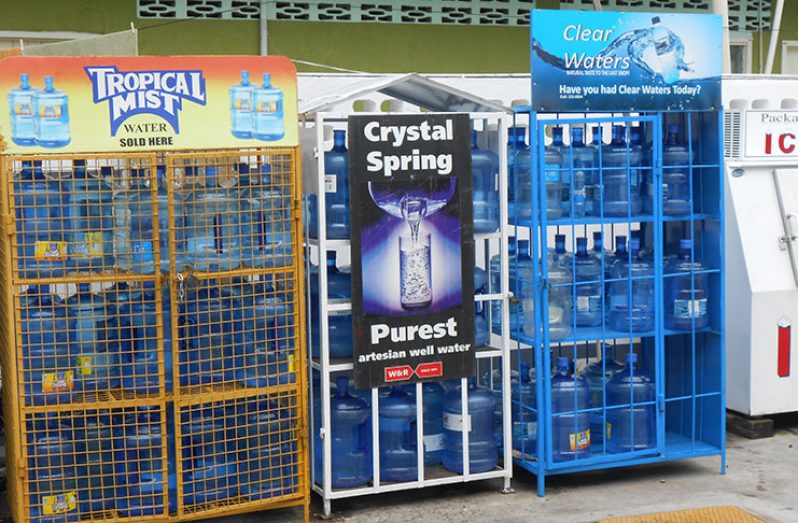By Neil Primus
 WATER is the most valuable thing to life on this planet. Plants and animals need it to live. It is a clear, tasteless and odorless liquid. More than two thirds of the human body weight is water. It is the only thing that has three natural forms – solid, liquid and gas.
WATER is the most valuable thing to life on this planet. Plants and animals need it to live. It is a clear, tasteless and odorless liquid. More than two thirds of the human body weight is water. It is the only thing that has three natural forms – solid, liquid and gas.
Seventy percent of the earth’s surface is covered by this liquid. Yet, 97 percent of this water is unfit for human consumption because of its salt content. The remaining three percent is fresh water. Of this tiny amount, 77 percent is solid (Ice). Only 0.3 % of all freshwater can be found in rivers, lakes and the atmosphere. This precious liquid with no calories or organic nutrients is critical to human existence. NO WATER! NO LIFE!
Man quickly realized its importance. Throughout history, civilization was centered around  large bodies of water. It was used for agriculture, drinking, bathing, cooking, food production and processing, transportation, power generation, waste treatment and recreation.
large bodies of water. It was used for agriculture, drinking, bathing, cooking, food production and processing, transportation, power generation, waste treatment and recreation.
Water became central to religion, fire-fighting and a number of other vital things. Hydro Generation is one of its most important uses. In some parts of the world water is a very scarce commodity while in others water is wasted. In the USA the following stats show the general trend in water usage.
SHOWER………………………………………………………………….16.8%
TOILET……………………………………………………………………..26.7%
FAUCET(TAP)…………………………………………………………….15.7%
LEAKS………………………………………………………………………..13.7%
LAUNDRY…………………………………………………………………..21.7%
OTHER……………………………………………………………………….5.3%
The average American household uses about 300 gallons of water daily. Seventy percent is used indoors and 30% outdoors. Normally 5-7 gallons is used to flush the toilet. When you take a shower 5 gallons per minute goes down the drain and 3-5 gallons when you use the tap.
In Guyana, we have a healthy supply of fresh water. Our surface water yield is approximately 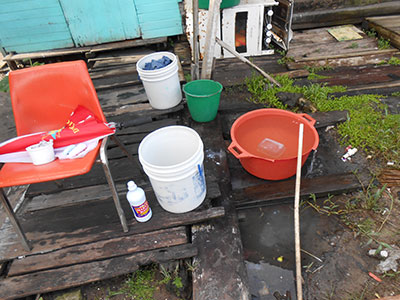 300,000 cubic feet per second via the Essequibo, Berbice and Demerara rivers. Shockingly, only two percent of this is used, mainly in agriculture.
300,000 cubic feet per second via the Essequibo, Berbice and Demerara rivers. Shockingly, only two percent of this is used, mainly in agriculture.
Our population is small compared to the size of our country. Our water demands are also small in contrast to the enormous water resources we possess. The population’s need of water is ever increasing. Soon the international demand for water will equal or even surpass the available water resources on this planet. We are truly blessed.
Every morning before you are fully awake there is the persistent honking of horns. The Water Truck has arrived. Then the second wave hits you and now you are fully awake. “Wata! Wata! Buy yu wata!” Many communities are subjected to this exact scenario – the sale of ‘drinking water.’
Of the numerous water businesses in this country, only some of them have been legally registered and certified by the Government Analyst Food and Drug Department (GAFDD). Situated in the compound of the University of Guyana, this agency is responsible for certifying any business that deals with food, medicine, cosmetics and medical devices. 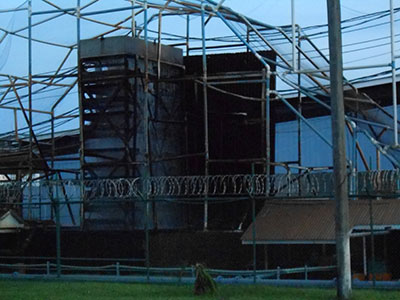
The process to become a legally operating entity is often ignored by those intent on making a quick buck. In order to become compliant, the intended business must first show ‘Land Use Clearance.’ That is, permission from the Central Housing and Planning Authority to operate said business on that location.
The second step is to register with the Deeds Registry. Only then should the application for license be made to the GAFDD. A plan/sketch, detailing the exact layout of the premises, equipment, process flow, diagram of each product to be manufactured, should be submitted with the application. If a label is to be used this too must be submitted for approval.
The GAFDD then inspects the business place to ensure that they are in compliance with all regulations. The final step is an examination of the finished product. Only after all the above 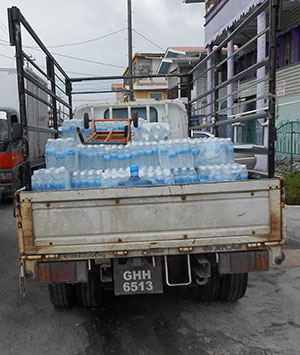 have been fulfilled should the business begin operations.
have been fulfilled should the business begin operations.
Some entities which sell processed water are not fully compliant. This gives their employees plenty of scope to be dishonest risking the health of consumers. Imagine this. A company fills large water bottles to be sold door to door. Because these bottles are not sealed, the smart worker decides to cash in. He/she quickly sells their product in a specific area. The bottles are then refilled, often at questionable sources. This water is then sold in another district. All the latter proceedings go into the pocket of the worker(s). The purity of the water is of little importance to such a callous person.
Even though the GAFDD has the power to seize such products and halt illegal operators, they can only do so if such operations are reported. Once this is done checks will be carried out and appropriate action taken. There is one Cardinal Rule of the GAFDD that should serve as a warning to customers. All bottles should be sealed before leaving the company. Guyanese should never purchase water from unsealed containers.
The mandate of the GAFDD is to protect consumers and to facilitate trade. All exporters depend on the ‘Free Sale Certificate’ from this agency in order to meet the criterion for export.
The department currently suffers from a drought of qualified staff. It presently has seven Food Inspectors and three Drug Inspectors. In order to function efficiently this agency needs 10 Food and 10 Drug Inspectors. Unfortunately, the salary being offered in not attractive enough to get these positions filled. The salary of these officers is approximately $76,000.
This heavy demand for drinking water in Guyana reflects directly on the Guyana Water Inc. This body came into being on the 30th of May, 2002 when the Guyana Water Authority and the Georgetown Sewerage and Water Commission was merged.
The role of this organization is to provide all Guyanese with safe, potable water. Every human being regardless of race, religion or political affiliation, has this basic right. Guyanese 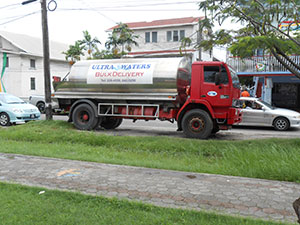 are no exceptions. With numerous Water Treatment Plants and Wells all over our country, there still remains this huge demand for bottled, drinking water. Unfortunately this water is less regulated than our tap water. There seems to be very little oversight over this industry.
are no exceptions. With numerous Water Treatment Plants and Wells all over our country, there still remains this huge demand for bottled, drinking water. Unfortunately this water is less regulated than our tap water. There seems to be very little oversight over this industry.
People in the United States purchase more than half a billion bottles of water every week. Guyana is following this same trend. This is encouraged by a litany of water woes. Far too frequently there is some ‘crisis’ with the water supply. Contaminated wells, mechanical problems, leakage, water loss, low pressure, tampering with the mains, water shortage, broken mains, vandalism and drought, feed this growing demand and dependency on bottled water.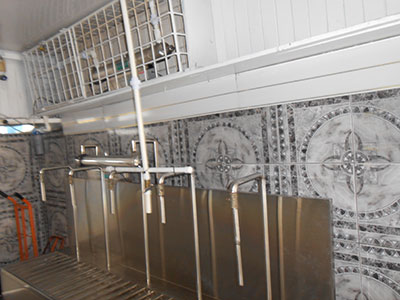
Are you a bottled water user?
Do you usually purchase water from roving ‘Water trucks?’
Have you bought bottled water lately?





.jpg)


